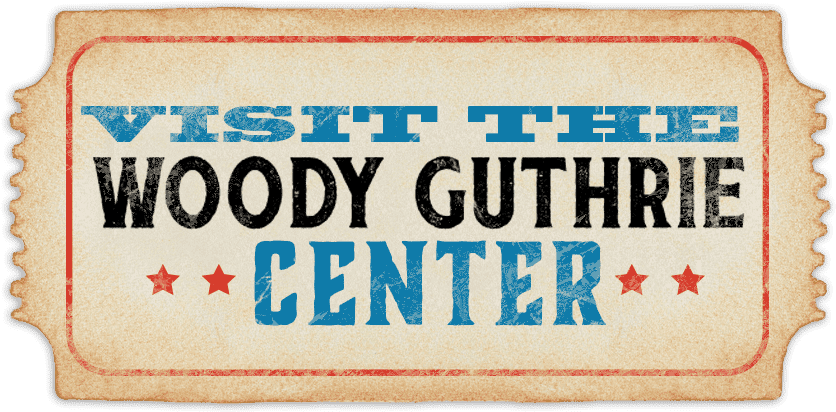ABOUT THE CENTER
A: If you are having difficulties reserving your visit online, please call 918-574-2710 during business hours or email info@woodyguthriecenter.org. You may also walk in to the center to purchase a ticket.
A: All tickets purchased in advance cannot be refunded or exchanged past date of admission.
Ticket changes must be made within 24 hours of ticket time. Failure to redeem or exchange within 24 hours will be considered a donation to the center.
For questions regarding tickets, please email info@woodyguthriecenter.org.
A: April 27, 2013.
A: The Woody Guthrie Archives & Special Collections consists of more than 10,000 items.
The collection continues to grow as new items and resources for education and research are added.
A: Prior to booking tickets, members will need to log in: https://secure.americansongarchives.org/account/login
If you have never logged in, but are a member, you will need to click “Reset Password” and follow the prompts. You must use the email you used to sign up for your membership, otherwise it will make a separate account and will not have your membership linked to the account.
If you have already created a member account, you do not need to create a new account. Please use your already existing account, as it will be tied to your membership. If you’ve forgotten the password, you may reset it to gain access to your already existing account.
Our system requires all transactions create an account, we apologize for any inconvenience this may cause.
A: Metered parking in the district is enforced Monday-Friday, 8 a.m.–5 p.m.
For the most up-to-date information regarding parking in the district, click here.
A: Service animals are permitted into the Woody Guthrie Center. We do not allow pets or therapy animals.

The center is now open.
ABOUT WOODY GUTHRIE
A: Woody Guthrie was one of the first artists who realized the power of his craft to create social change. He became a voice for those who were disenfranchised and a source of power for those who needed strength. Today, Woody is an inspiration to realize the power of your own voice. His message is still relevant and vital in the fight for equality and justice.
A: He had eight children: Arlo, Nora, Lorinna Lynn, Bill, Cathy, Joadie, Sue, and Gwen.
A: Arlo visits as often as possible. You never know when a member of the Guthrie family will stop in to visit the Woody Guthrie Center!
A: Yes! Woody was a highly accomplished visual artist. In the Pampa phone directory, his number was listed beside his occupation: “sign painter.” His art is multifaceted and took many different directions and styles as you can experience in the center.
A: No. There is no mention of Woody visiting Tulsa. He grew up in Okemah, Oklahoma.
A: He definitely did not know Will Rogers, but Woody admired this other native son so much he named his first song “Will Rogers Highway,” and he modeled his homespun persona on Will Rogers. Woody’s daughter Nora and Bob Wills’ daughter Carolyn both feel the two men may have met, but there is no documentation to confirm.
A: Huntington’s disease.
A: Huntington’s disease is a genetic degenerative neurological disease. Please visit Huntington’s Disease Society of America for detailed information and join us in supporting the research to find a cure.
A: Two of Woody’s daughters from his first marriage, Sue and Gwen, died from Huntington’s disease.
A: No. He lived most of his adult life in New York.
A: Woody’s hometown of Okemah is an annual trip for the team every summer to celebrate his birthday at the Woody Guthrie Folk Festival. To reach the most people, the center for exploration and education needed to be in a more populated area, where there are many schools (both urban and suburban) and the funding to realize the vision. Those things were all available in Tulsa with financial support from the George Kaiser Family Foundation.
A: Woody was never a member of any political party. He called himself a “commonist” who supported the common people. In his own words, “Left wing, right wing, chicken wing … it don’t make no difference to me.” His ideas were very progressive for his time and often were frightening to those who feared change from the status quo. Woody started the work, and it’s up to us to keep marching for equality.